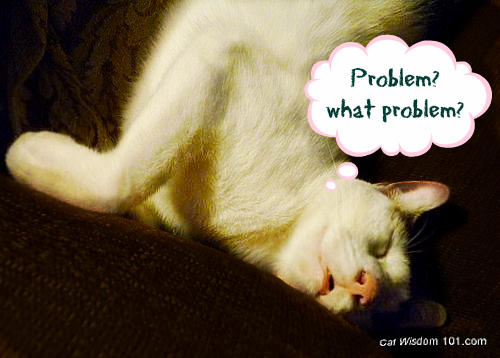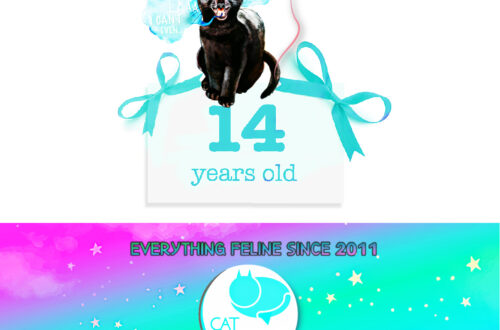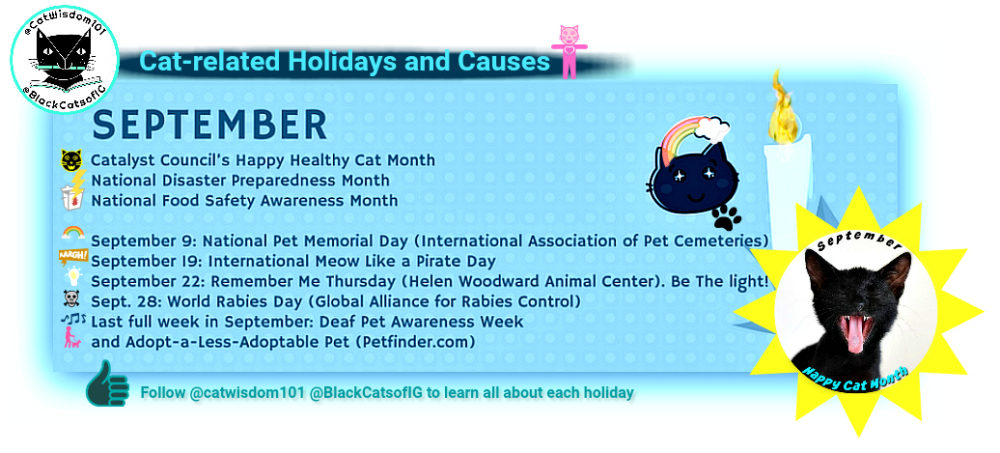Vet 101: When it Sucks to be a Cat

There are no 12 step programs for cats but there are behaviorists and vets. This week our vet Dr. Rich Goldstein is back with a reader Q & A about sucking.
While Dr. G. can’t diagnose online, he can play detective and there are many clues in this letter.
Question: My cat Ziva was never weaned. She was found with her brothers when she was 2 days old. She sucks on herself while making a kneading motion with her paws. It looks like she’s nursing on herself. We got her at 6 weeks and this behavior began a few weeks after we got her. Do you think it’s that she never got to nurse on her mother? There are no bald spots on her fur so she’s not licking herself raw. It’s more of a sucking sound. So I don’t know what’s going on. She picks a different spot each time. I can’t pull her away when she starts. She goes into a sort of a trance. It goes on for a while. It occurs quite often. It’s like an autistic thing. She about 10 months old now. It’s not self-grooming and there’s no raw spots. She was spayed in April and that’s the last time she saw the vet. She doesn’t purr when she does it and she does it in bed snuggled up to me and my partner. Toys don’t distract her. She gets tons of attention. Can I stop it? Can I distract her?
Answer: As I read your question, the phrase that kept running through my mind was, “When you’re stressed, go to your ‘happy place’.” When cats exhibit suckling behavior, the theory is that it is a “comfort behavior” that essentially takes them back to a time of warmth and safety when they were protected by their mother (i.e. their “happy place”). Sometimes they purr, sometimes not. Some behaviorists have likened this behavior to thumb-sucking in children. Others have suggested that suckling behavior stimulates the release of “endorphins” from the cat’s brain that makes her feel good (which may explain the “trance-like” state you’re noticing). It becomes a self-rewarding behavior: the more the cat suckles, the more endorphins are released, the better the cat feels, the more she suckles, and so on. So you can see why it can be difficult to convince a cat to stop doing it!
In most cases, cats that suckle were weaned or taken away from their mothers at an early age. In some cats, the suckling can be triggered by stressful situations or anxiety. Most cats that suckle will do it for life. But there are some things you can try to deter her from the behavior:
- If a specific trigger can be pinpointed (like she does it every time the mailman slams the mailbox shut), try to eliminate the trigger.
- Increase oral stimulation, like Kitty Kong or long strips of tasty foods or other interactive toys, that may help divert her attention and reduce the tendency to suckle (i.e. find something that provides more pleasure than the suckling).
- A Feliway diffuser may help reduce anxiety and the “need” to suckle.
- Provide rewards and reinforcement for non-suckling behavior.
- In some cases, where the skin is becoming irritated, health issues are arising, or the behavior is becoming obsessive-compulsive, your vet may prescribe some medications (like clomipramine) to help reduce the anxiety levels while you employ some behavior-modification techniques.
- Use caution with “negative reinforcement” techniques (such as shaking a can or spraying water), as these can sometimes increase anxiety, which could actually lead to more suckling behavior.
- Also be aware that sometimes paying too much attention to the cat while she’s exhibiting this behavior can actually reinforce the behavior. Some cats will stop doing it if you ignore them.
You can try many positive methods to break the habit. But it’s important to realize it may take lots of time and “patience, grasshopper.” But as long as she’s not hurting herself or others, there could be worse habits to have!
Editor’s Note: Ziva is still a kitten and may outgrow or reduce the behavior in time. Odin (pictured above) was a heavy suckler but has gradually reduced his frequency at age two. His self-soothing time was (and still is) in the evening or bedtime. I chose not to alter the behavior since he’d had enough trauma, being abandoned as a young kitten and losing an eye.




18 Comments
Pingback:
pheromones questions
hrh3n3o561dtj, pheromones for cats [url=http://usepheromones.webs.com/]pheromones released during ovulation[/url] xkcd ants pheromones [url=http://pheromone101.webs.com/]pheromonoes[/url] pheromonoes [url=http://buypheromones.webs.com/]pheromones kids[/url] pheromones hair
Texas, a cat in New York
Thanks, that was very interesting because neither of us three are doing it at home.
But I am drooling too when I am making biscuits (the humans have funny expressions, don’t they?) and purring at the same time.
Purrs
catfromhell
Kozmo does that! It kind of drives Daddy nuts. But wes knows he was dropped off in a plastic bag at a pet store when he was 3 weeks old. We was hoping he wwould grow out if it, he does it lits less, but still does it.
Kisses
Nellie
Tracy Dion
Very interesting post, Layla. I’ve never owned or fostered a cat with a self-sucking habit, ‘though I’ve heard of it before. I was not, however, aware it was likely a long-term behavior that could only be somewhat ameliorated, at best.
Totally sharing on CatCentric.org’s Facebook, Twitter and Pinterest pages! ;-}
Skeeter and Izzy
I have had several suckling kitties. There have been a few that did it their entire life. It never seemed to hurt anything and did seem to provide that comfort zone. All of my fur kids have been foundlings and haven’t had the best start in life for sure.I just always let them do what felt right for them as long as it wasn’t proving to cause any ill effects like you mentioned . Luvs Skeeter and Izzy >^..^< …I'm just a baby cat
Abby
Very interesting.
Thank you for the excellent information
purrs
>^,,^<
✿•*¨`*•. ♥Abby♥Boo♥Ping♥Jinx♥Grace♥✿•*¨`*•.
CATachresis
Very interesting! I’ve not come across that exactly before. I wonder if it is an extension of drooling when making biscuits! Austin does this. Drools big time and only does it when he’s on my lap!
boomermuse
Yes, and drooling is a sign of contentment. Odin does that as well 😉
meowmeowmans
Interesting post, Layla! We have a kitten at the shelter who suckles on a stuffed toy. He and his siblings came in when they were pretty little … so they fit in the “weaned too early” category for sure.
The Musings Of A Crazy Cat Lady
Layla thank you for such informative information. My late tuxedo cat, Tereza was a lifelong suckler. She used to suckle on my earlobes. My vet and I tried all sorts of things to attempt to redirect her behavior, but none were successful. She, too would go into a trance-like state. She was still sucking on me at the age of four when I told her she needed to be a big girl. I hope that didn’t contribute to her sudden heart failure. I can think of worse things that can be done, though!
Brian
Well that isn’t that unusual and it never really sucks being a cat!
CarenOsrinGittleman (@CatChatCaren)
Cody tends to suck on blankets when he is “making biscuits” I have ALWAYS said he was probably weaned from his Mama too soon!! He also has the strangest “biscuit making” technique I have ever seen lol
Random Felines
The adults don’t do it, but we had one kitten that was an ear sucker – namely MOM’S ear….she had to warn his new family when he was adopted. He could eventually be distracted, but once he got going, you had to hope he fell asleep (which he normally did).
hannbal2
Just to add a note to my description of the situation with Ziva, she does this only when she comes into bed to lie next to my husband or me or sit on top of me or him and then she begins the sucking and kneading. She never does this anywhere else or when she’s alone or with her brothers.
boomermuse
The fact that she doesn’t do it any where else or with the feline brothers suggests Ziva targets you and your husband as her mom and feels secure doing the sucking close by and yet not on you or your clothing.
d'Artagnan Rumblepurr
Sweet Odin, I’m glad he’s got such a good home now, it sounds like he’s been through a lot.
Kathryn
Wow, how revelatory – I am guessing that this may be why Ched bites his tummy fur, in addition to being a kneader. We had thought his tummy fur issue was because his brother Mao beats up on him as part of grooming and play fighting, and I guess Ched returns to his mother days – he had a mother until 5 months but was only with her until 2 mo when the shelter rescued the Mom and four boys – two tux and two orange boys from a woodpile in a suburb. We got one of the pairs of twins. Tux/Orange.